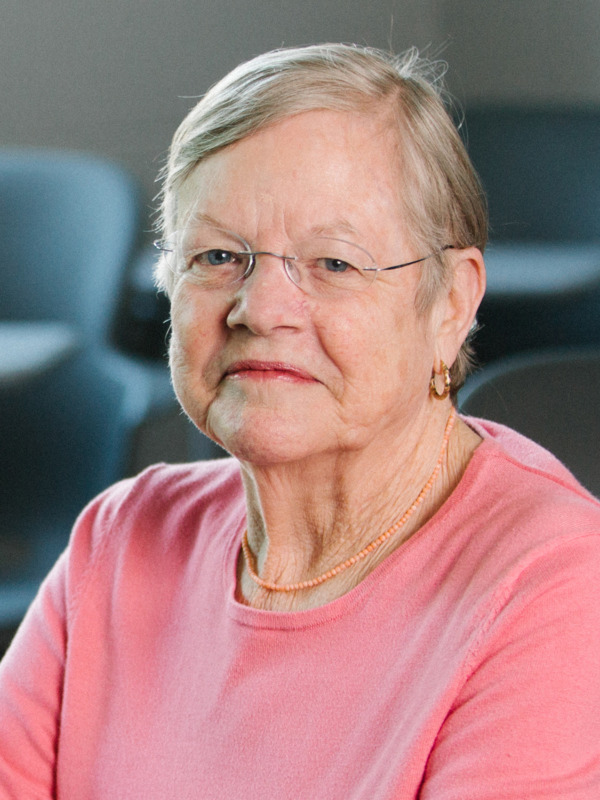The following article is from the Fall 2022 issue of Edge: Carolina Education Review.
Is American democracy — what Alexis de Tocqueville called our “great experiment” — in trouble?
Cooperative attempts to address social concerns increasingly appear fraught. The rise of authoritarian regimes and of “alt-right” nationalism masked as populism, together with deepening cultural and political polarization, make these dangerous times for democracy, says Lynda Stone, Ph.D., the UNC School of Education’s Samuel M. Holton Distinguished Professor emerita.
But, Stone, a philosopher of education, says dangerous times are when philosophy is most needed.
Considering now the time to get to work, Stone has two proposals for combatting the dangers facing our political moment: pragmatist ethics and small democracy.
Reconsidering democracy
Central to much of Stone’s intellectual project stands the work of pragmatist philosopher John Dewey. A key figure in 20th century American thought, Dewey is known for texts such as “Democracy and Education” (1916), “The School and Society” (1899), and “The Child and the Curriculum” (1902). Generations of educational theorists and practitioners have combed the historical Dewey for solutions to contemporary social and educational problems. However, Stone reasons this might be a problem. More to the point, she thinks a textually literalist or ahistorical reading of Dewey might offer more of a cul-de-sac than a thoroughfare towards new democratic and educational futures.
In Stone’s reading, Dewey was constantly “working within and theorizing about context … democracy must be theorized in a present and for a present” (Stone, 2016). He was always rethinking his own notions of democracy, education, and any connection between the two. Much of Stone’s writing is premised by this and the belief that “Dewey himself would … welcome new insights about his work pertinent for new times” (Stone, 2008).
Put otherwise, Dewey requires a constant re-thinking if he is going to speak to contemporary issues.
Importantly, reassessment doesn’t mean throwing the entire Deweyian baby out with the contemporaneous bathwater. Rather, the pragmatist’s intellectual chore is to find what is worth retaining in Dewey’s thought and discarding what isn’t contextually useful (Stone, 2016). Chief among what Stone wants to preserve in this oeuvre is Dewey’s robust notion of democratic life.
Dewey writes that “democracy is more than a form of government; it is primarily a mode of associated living, of conjoint communicated experience. The extension in space of the number of individuals who participate in an interest so that each has to refer his own action to that of others, and to consider the action of others to give point and direction to his own, is equivalent to the breaking down of those barriers of class, race, and national territory which kept men from perceiving their full import of their activity” (Dewey, 1916).
Dewey offers democratic life as a simultaneously individual and collective venture. Stone agrees. Re-thinking Dewey, as such, to combat contemporary dangers to democracy require both types of projects simultaneously.
A pragmatist ethic
In her article “From ethics to ethics: combatting dangers to democracy,” Stone notes how Dewey believed “in what is accomplished without a-priori foundation of what is to count as knowledge … an understanding that a pragmatist orientation towards life [is] ingrained … [in] practices” (Stone, 2019). Knowledge without external guarantee presents a litany of knotty considerations. Individual ethical action is near the top of the list.
Snubbing a stock Platonic or neo-Kantian moral pose, Stone offers ethical action as neither objectively evaluable or idealistically warranted. Rather, justification for a particular posture or practical deed lies in the actions social consequence (Stone, 2019). In other words, Stone’s notion of a pragmatist ethic claims that moral attention should be drawn towards contextual practice and consequence over and against transcendent justification.
Take the matter of teaching civility as a democratic virtue as an example. One could hardly contend that conversational tolerance and cooperation are staples of contemporary American life. As such, attempts at civic dialogue and collaboration seem little more than a fool’s errand.
Taking up precisely this issue, Stone writes that “lack of respect is a matter of societal care for individuals but, as teachers … [it is] also a matter of politics … [it] is imperative … to envision these political associations as fundamentally interpersonal and ethical.” (Stone, 2019).
Directly confronting socio-cultural currents of disrespect and discord, an ethical democratic pedagogy asks teachers to both directly confront and positively demonstrate models of interpersonal democratic association. Practically, Stone urges teachers to undertake with students “actual projects [that] might ‘get them out of themselves’ … assuming stronger self-respect in enacting [a] democracy they actually can see” (Stone, 2019).
Small democracy
Coupling its interpersonal demands, democracy as a form of associated living requires collective enterprise. Stone wants to shift attention away from formal institutions and grand theoretical conjectures to “everyday dilemmas” (Stone, 2016).
To that end, Stone proposes considering democratic association in the lower case. Democracy with a small “d” involves forms of participatory association around a local project or shared concern “that gets beneath politics” (Stone, 2016a).
Given its necessarily hands-on character, small democracies can, perhaps, be best elucidated by examples drawn from Stone’s own biography. While teaching middle school for more than 15 years, Stone enacted numerous small democratic projects. In a footnote to her recently published essay “Youth power — youth movements: myth, activism, and democracy,” Stone describes how “as a young teacher in California, [she] taught on the first Earth Day and advised a middle school club that indeed did plant trees” (Stone, 2021).
More than being an act of green do-goodery, Stone offers this project as an activist, educational, and, most importantly, democratic undertaking wherein students appraised their relationship to the environment. An undertaking only more imperative today given the dangers posed by climate change (Stone, 2021).
Another instance of Stone’s enactment of small democracy in her teaching is a stop sign she and her middle school social studies class lobbied to have installed at a dangerous intersection close to the school. By way of letters to elected politicians, local gatherings, and community organizing, a concern for public safety was directly addressed.
Small democratic associations are local, ethical, and concrete. They begin with an identification of a local problem and progress by way of individuals voluntarily uniting around an everyday concern. Stone’s arboreal and traffic examples attest. What’s more, small democracies’ sums are greater than the addition of their parts. Through the enactment of small “d” democratic practices, individuals both address local concerns and receive an education in self-governance. In other words, small democracies are both practical and pedagogical.
Small democracy and schools
Democracy, for both Dewey and Stone, is preeminently educational. Here lies one of Stone’s central ideas.
To help promote the furthering of our democratic experiment, teachers should adopt the discourse of “citizen educator.” Teachers need to engage in conversations with students, with families, and with communities, encouraging all to consider themselves “citizen educators.”
She writes in her 2019 paper “From Ethics to Ethics: Combatting dangers to Democracy,” “In American schools, beginning in school-based professional learning communities or common planning times, action groups will explore local needs, taking time to study specifics and with students will explore local needs, will co-plan and implement direct action. In addition to organizing across grades and school subjects, they can extend between school levels or paired groups across diverse districts. Examples include assisting voter registration, locating supplies for food deserts, and teaching immigrants to prepare for citizenship exams.
“Possibilities are unlimited.”
Resources
DeTocqueville, A. (1899). Democracy in America (trans. H. Reeve). New York: D. Appleton and Company.
Dewey, J. (1990). The School and Society and The Child and the Curriculum (intro. P.W. Jackson). Chicago, IL: The University of Chicago Press.
Dewey, J. (1916). Democracy and Education – An introduction to the philosophy of education. New York: The MacMillan Company.
Stone, L. (2008). Speculation on a missing link: Dewey’s democracy and schools. Journal of Educational Controversy 3 (1): 1-14.
Stone, L. (2016). Subverting Dewey for Dewey to Succeed. John Dewey’s ‘Democracy and Education: 100 Years On: Past, Present, and Future Relevance. International Conference Panel: Too Toxic for Policy, University of Cambridge, UK, October 2016.
Stone, L. (2016). Re-Thinking Dewey’s Democracy: Shifting from a Process of Participation to an Institution of Association. Journal of Curriculum Studies 48 (1): 77-93.
Stone, L. (2019). From ethics to ethics: combatting dangers to democracy. Ethics and Education 14 (2): 143-56.
Stone, L. (2021). Youth power – youth movements: myth, activism, and democracy. Ethics and Education 16 (2): 249-61.
